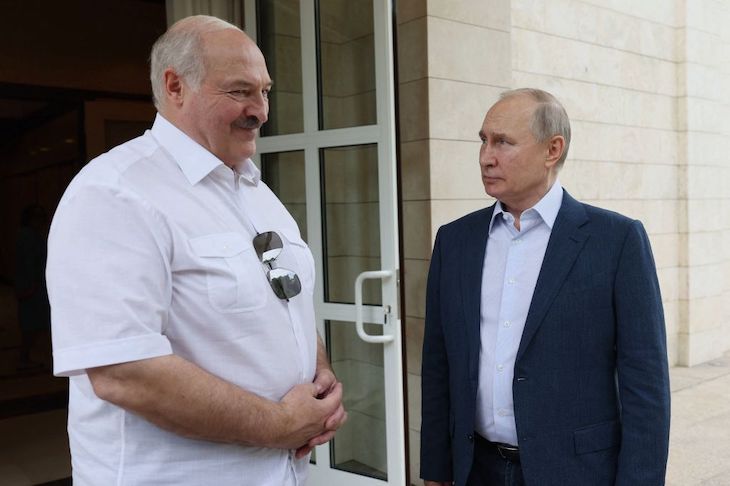What to make of the strange Prigozhin interlude? The putsch that was and wasn’t. The facts are simple. After an alleged attack on Wagner troops by the Russian army ordered by defence minister Sergei Shoigu and chief of general staff Valery Gerasimov, Prigozhin’s private army of 25,000 took control of the garrison town Rostov-on-Don and its airfield at 7.30am on 24 June. Shoigu fled the town and Gerasimov hid. A warrant for Prighozin’s arrest was issued in Moscow, as he quickly unleashed a ‘march of justice’ on the capital. The Kremlin doubled down and rolled out Putin on TV, who called the Wagner mercenaries’ actions ‘armed mutiny’, ‘a stab in the back’, ‘treason’ and warned that ‘everyone who deliberately embarked on the path of betrayal will suffer inevitable punishment’. He publicly all but proclaimed Prigozhin’s death certificate in terms that couldn’t be clearer.
Matters soon became surreal, however. Wagner troops found no opposition as they sped to Moscow and there were reports of even army-intelligence GRU not standing in their way. It was reported – wrongly, it seems – that Putin’s private planes had left Moscow. Then, deus ex machina-style the otherwise insignificant figure of Belarus president Lukashenko stepped in and brokered a deal. The rebellious Wagner troops, including Prigozhin, would be welcome in his country, he said, and, in return for complete amnesty, would have to call off their march on Moscow. Prigozhin promptly did. He even went further, saying that there had never been an army attack on his troops, and that he supported the war in Ukraine.
What to make of these 24 hours no one could have dreamt up in their wildest dreams?
One obvious explanation is that of the agent gone rogue. Prigozhin, the chief of the Wagner Group, began to feel dizzy with success. He believed in his popularity (fanned by the Russian state-controlled media), and he thought himself independent and autonomous. He thought that, after all, he was no worse than many other FSB agents who had infiltrated Russian society and businesses by the thousands, and eventually became politicians, businessmen, and bankers recognized in Russia. The duels between Prigozhin, on the one hand, and Shoigu, Gerasimov, and president Kadyrov of the Chechen Republic, entertained the public. But, because behind Kadyrov, Shoigu and Prigozhin stood, it seemed to everyone, Putin personally, no one took the confrontation seriously.
The involvement of Lukashenko in an internal Russian matter makes little sense
So, when Putin ordered the Wagner Group to be taken away from Prighozin and placed under the authority of Shoigu, a fuse blew, according to this version of events. The Wagnerians under Prighozin’s demand refused to comply. Then, on Shoigu’s orders, Russian army helicopters seemingly set out to attack the Wagnerian camps. Either Shoigu was out of Putin’s control or Putin gave Shoigu an order to punish the Wagnerites he had lost control of. It was difficult to understand who betrayed whom – Putin, Shoigu, or the FSB. A snap decision had to be made, and Prigozhin made it: to go to Moscow and kill his enemies rather than be killed by them.
Mad, for sure. But from Rostov to Moscow, it was just over 600 miles. Defending against the attacks, the Wagnerians reportedly shot down several Russian military aircraft. The media reported that Moscow had been placed under martial law, that there were tanks and armoured personnel carriers in the streets, that all buildings of importance had been taken under protection by the security forces, and that all public events had been cancelled.
What undermines the ‘Prigozhin the Maverick’ story, however, was the bombshell from the press service of Lukashenko. The Belarussian president, it turned out, had spent the whole day negotiating with Prigozhin and persuading him to turn back. Nikolai Patrushev, former director of the FSB and the all-powerful secretary of the Russian Security Council, also reportedly took part in the negotiations.
The involvement of Lukashenko in an internal Russian matter makes little sense. Prigozhin began his connection with Putin as his cook, an important position of trust in a country laced with poisons. But his FSB connection started before that while in prison – where he was recruited and proved himself useful and was then introduced to Putin. Since Putin trusted only ‘his own’, Prigozhin, who was also a former criminal (and, as a result, a vulnerable man), Putin felt comfortable around him and had absolute trust in him.
Prigozhin’s self-confidence towards the Russian army was based on the fact that he had both the backing of Putin personally and the FSB. No former criminal would be allowed to set up a paramilitary organisation on their own. Prigozhin’s prosperity and impunity before his putsch was understandable.
Seen in this light, Patrushev, one of Russia’s top FSB-ers after Putin, didn’t strictly speaking need Lukashenko to mediate between the FSB and Prighozin. Could it be that Lukashenko was not a mediator in the negotiations between Prigozhin and former FSB director Patrushev but between Patrushev, representing the FSB, and Putin?
It is even possible that Prigozhin was merely involved in these negotiations as an instrument to exert pressure on the Russian president. The real threat was that, if Putin did not agree to Patrushev’s (i.e. the FSB) terms, Prigozhin would take over Moscow and Putin would lose power.
In the time ahead, the terms of such a Patrushev-Putin-via-Lukashenko deal may become clearer. One thing is certain, it is absolutely impossible to accept the explanation of Prigozhin, that he refused to storm Moscow to avoid spilling ‘Russian blood’. Unless he is acting on behalf of powerful protectors, he knows that Lukashenko’s puppet regime is not going to save him from the loss of face he has inflicted on the Kremlin.
Yuri Felshtinsky is author of Blowing up Ukraine: The Return of Russian Terror






Comments